Trade Aid is a UK based charity aimed at poverty alleviation in Southern Tanzania by creating educational and employment opportunities for the local community and assisting in the development of a sustainable tourist industry in Mikindani. As part of this, Trade Aid take on volunteers to work with the local community. Tim Crouch is one of these volunteers and her he writes about his experiences in the beautiful coastal town of Mikindani. For more information on the work that Trade carries out, see: http://www.tradeaiduk.org/
As the sun sets over Mikindani, the smoke sits in the valley and the sounds rise; after another day in paradise I can't help thinking about the overload heaped upon my senses whilst in Tanzania. The sights can always be captured by camera and many of the most delicious smells can be recreated in the kitchen buts it's the sounds that make Mikindani so special and it's the noises that will stick most in the mind. Words can only scratch the surface of the overload Mikindani places upon the sense of hearing.
The day always starts early in Mikindani and with it so do the sounds. At first light you hear the scraping, scratching noise of women sweeping, invariably just out side your door, a sound that rarely stops before it has accomplished its two aims of cleaning the street and waking Mikindani's inhabitants. Only after this sweeping has woken them up, do the cockerels start to crow. Being in Mikindani, you are never far away from some livestock, be it cows, goats or chicken and so you never feel far away from the farmyard. There is a theory circulating Trade Aid in Tanzania that animals in Tanzania are bred not for their meat (there can be none more gristly on earth) but for their capacity to break eardrums.
The first real human voices come following the early morning school bell, a rock hit against the redundant rim of an old car wheel signifies the children's long and noisy walk up the hill to school. During the day office work is accompanied by the dulcet tones of the women next door calling their various kids for various reasons from various corners of Mikindani. When the children finish school in the afternoon, again accompanied by a ring of the school “bell”, the noise starts off as a distant cheer and culminates in a crescendo of young voices shouting their delight at returning home after a hard day in the classroom. This shouting just puts them in the mood for some more shouting when the games start during the afternoon, a din that doesn't stop until early evening when again the various mamas call their various offspring this time purely for the reason of feeding time.
As you walk out to the road you are hit by the same diesel fumes encountered the world over but the amount of noise produced by such a tiny volume of traffic is a phenomenon unique to East Africa. The combination of decrepit engines and wildly elaborate horns produces a sound that will eclipse anything produced in a New York traffic jam.
As we sit down to dinner the call to prayer from the mosque chimes in for the fourth and therefore penultimate time that day. After dinner we walk down the hill with the food for the dog, the fourth resident of the Trade Aid house to the sound of his whimpering at the smell of the leftovers we are carrying. Just as we lay in bed trying to get to sleep the women of Mikindani have one last blast this time to round up the men of the town before allowing all of us to slip off until the next day when the sensory overload will start all over again. I for one will miss it like crazy.





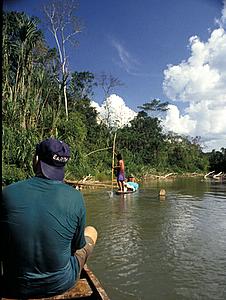 Mistake, mistake, mistake – How could I have made such a stupid
mistake. At our late lunch stop I had changed from boots to
sandals, strong sandals, the problem was not with the footwear but
with my brain which seemed to have gone into non thinking mode as
the day started to turn to twilight. We had been walking fast,
through thick rain forest and crossing and re-crossing rivers or
maybe even the same river. The last few Kilometres of the twenty
seven from our jump into the jungle to the 'Yawanawa'
village, our guides had decided to make what was a two day trek
into one. Why? I have no idea, unless it was too see how we would
make out. My legs felt like lead pillars as I walked in the river
my sandals acting like buckets holding my down feet, like walking
in treacle, my heart pounded loudly with each stride as I tried to
keep up with 'Yawanawa' Indian ahead, who was starting to
disappear in the dusk. The tribe had warned us that the rain forest
was very dangerous at night and they would always be back in the
village by nightfall! Just as I thought I could go no further and
dusk started to turn to darkness, I saw a figure on the shore about
a hundred metres away waving me on. I staggered up to Adam Baines,
for that's who it was, as he said “Well done Tony we have
made it” and we shook hands. Months of politicking in the
urban jungle, then many adventures on the way to our final
destination, the 'Yawanawa' village of Novo Esperanca – At
last we had arrived or nearly, the last hurdle or just about the
last straw, was about seventy steps cut in to the steep river bank
leading up to the village.
Mistake, mistake, mistake – How could I have made such a stupid
mistake. At our late lunch stop I had changed from boots to
sandals, strong sandals, the problem was not with the footwear but
with my brain which seemed to have gone into non thinking mode as
the day started to turn to twilight. We had been walking fast,
through thick rain forest and crossing and re-crossing rivers or
maybe even the same river. The last few Kilometres of the twenty
seven from our jump into the jungle to the 'Yawanawa'
village, our guides had decided to make what was a two day trek
into one. Why? I have no idea, unless it was too see how we would
make out. My legs felt like lead pillars as I walked in the river
my sandals acting like buckets holding my down feet, like walking
in treacle, my heart pounded loudly with each stride as I tried to
keep up with 'Yawanawa' Indian ahead, who was starting to
disappear in the dusk. The tribe had warned us that the rain forest
was very dangerous at night and they would always be back in the
village by nightfall! Just as I thought I could go no further and
dusk started to turn to darkness, I saw a figure on the shore about
a hundred metres away waving me on. I staggered up to Adam Baines,
for that's who it was, as he said “Well done Tony we have
made it” and we shook hands. Months of politicking in the
urban jungle, then many adventures on the way to our final
destination, the 'Yawanawa' village of Novo Esperanca – At
last we had arrived or nearly, the last hurdle or just about the
last straw, was about seventy steps cut in to the steep river bank
leading up to the village.
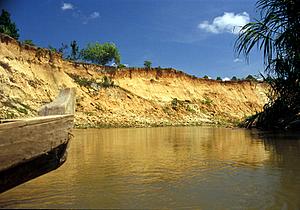 The 'Yawanawa' were early risers, the queue for the
bathroom or in this case the river started at 0415 hours for the
women and then the men from about 0445 hours. Breakfast consisted
of something from the day before, usually highly salted and
difficult to keep down as the sun started to kiss the village roofs
of the 'Yawanawa'.
The 'Yawanawa' were early risers, the queue for the
bathroom or in this case the river started at 0415 hours for the
women and then the men from about 0445 hours. Breakfast consisted
of something from the day before, usually highly salted and
difficult to keep down as the sun started to kiss the village roofs
of the 'Yawanawa'.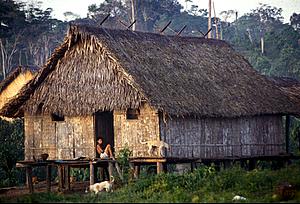 We had a
special treat one night, when the chief switched the fridge on for
a couple of hours and we had a mug of cold water that tasted as
good as any cold beer I have ever tasted.
We had a
special treat one night, when the chief switched the fridge on for
a couple of hours and we had a mug of cold water that tasted as
good as any cold beer I have ever tasted.
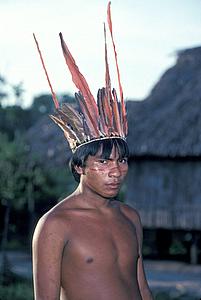 These Indigenous people had five different ways of sustaining
themselves,' in the depth of this green paradise.
These Indigenous people had five different ways of sustaining
themselves,' in the depth of this green paradise.
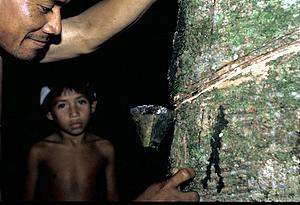 The two ways they made some money was with 'Aveda', a
Canadian firm that bought Uruku off the 'Yawanawa' for the
making of their expensive and famous make up, sold in top shops
like 'Harvey Nichols' both here, France and in North
America. The second way was with tapping the rubber and making it
into a sort of vegetable leather used in bags of all types and also
sold in quality shops in the worlds fashionable capitols.
The two ways they made some money was with 'Aveda', a
Canadian firm that bought Uruku off the 'Yawanawa' for the
making of their expensive and famous make up, sold in top shops
like 'Harvey Nichols' both here, France and in North
America. The second way was with tapping the rubber and making it
into a sort of vegetable leather used in bags of all types and also
sold in quality shops in the worlds fashionable capitols.
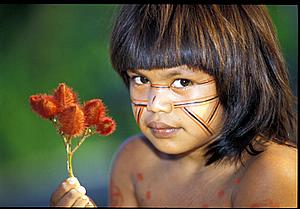 The children had half a day of school and half a day of learning
how to work like their parents, in whatever was their speciality.
The best hunters or fisherman got the best and most desirable woman
as wives. I asked why no one seemed to wear glasses or have bad
hearing? – The answer was simple nobody would marry anyone with
those problems and therefore they were bred out – Survival of the
fittest! Adam's words echoed round my brain, “Lucky you
were born in London Tony”.
The children had half a day of school and half a day of learning
how to work like their parents, in whatever was their speciality.
The best hunters or fisherman got the best and most desirable woman
as wives. I asked why no one seemed to wear glasses or have bad
hearing? – The answer was simple nobody would marry anyone with
those problems and therefore they were bred out – Survival of the
fittest! Adam's words echoed round my brain, “Lucky you
were born in London Tony”.
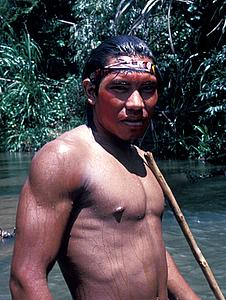 Antonio looked after the canoes and water transport; the tribe
would have its own specialists just as we do in our world. The
Chief himself would deal with the outside world business. The
Marriage with outsiders was not encouraged, The 'Yawanawa'
did not want Aids to in filter the village and also when a non
Indian married one of their girls, they tended to take the bride
out of the tribal area to live.
Antonio looked after the canoes and water transport; the tribe
would have its own specialists just as we do in our world. The
Chief himself would deal with the outside world business. The
Marriage with outsiders was not encouraged, The 'Yawanawa'
did not want Aids to in filter the village and also when a non
Indian married one of their girls, they tended to take the bride
out of the tribal area to live.